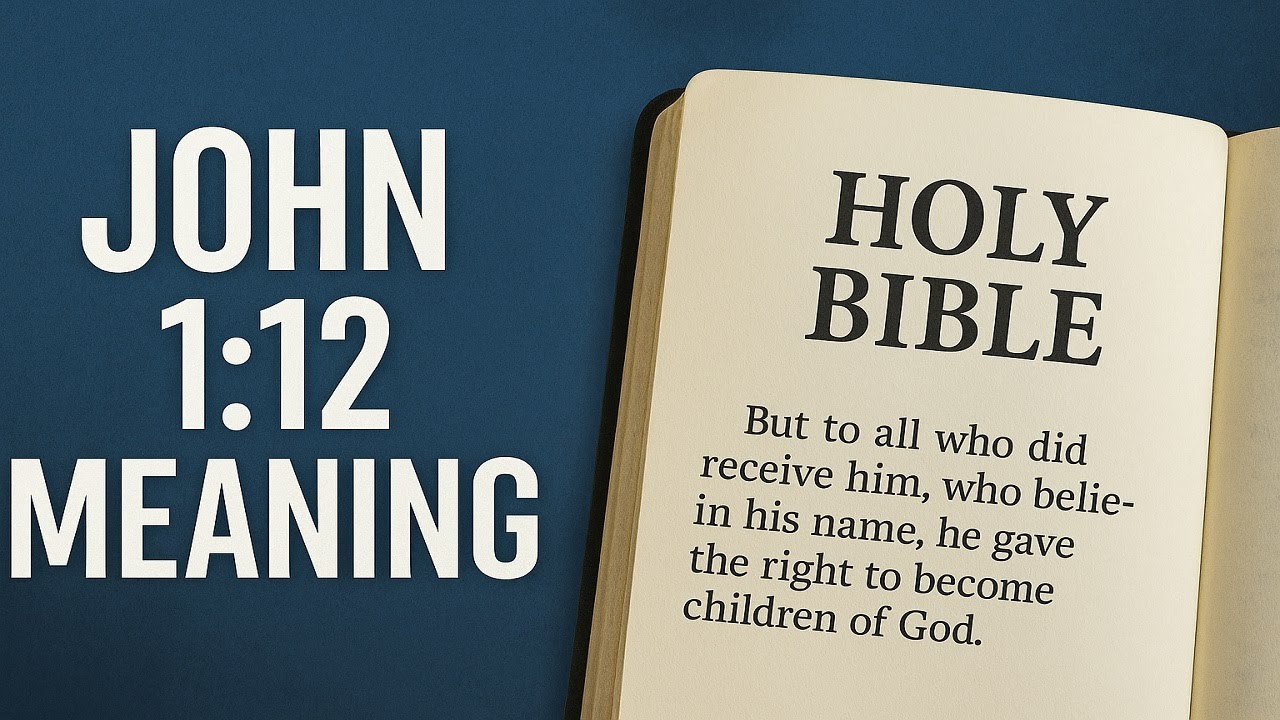You know how some verses just become… background noise? You’ve heard them a thousand times. You could probably quote them in your sleep. For the longest time, John 1:12 was that verse for me. I knew the words, but I didn’t feel their weight. Then one day, it clicked. It stopped being just a line in the Bible and became a staggering reality. The verse says, “But to all who did receive him, to those who believed in his name, he gave the right to become children of God.” We’re about to unpack the John 1:12 meaning, and I promise you, it’s about so much more than a simple change in status. It’s about a new identity.
A new family. An invitation.
More in John Chapter 1 Category
Key Takeaways
- “Receiving” is a Choice: When John 1:12 talks about “receiving” Christ, it doesn’t mean passively agreeing. It means actively, personally welcoming Him into the driver’s seat of your life.
- Trusting “His Name” is Everything: Believing in Jesus’ “name” is more than a historical nod. It’s putting your entire trust in His character, His power, and His work on the cross.
- This is a Legal Right: The Greek word for “right,” exousia, isn’t about permission. It’s about authority and legal privilege. It’s a bestowed status that cannot be taken away.
- It’s a Journey of “Becoming”: We aren’t automatically born into God’s family spiritually. We are given the right to become His children—a transformation and adoption gifted by Him.
- Merit Has Nothing to Do With It: The very next verse, John 1:13, slams the door on any idea that this is based on our family tree, our good intentions, or our hard work. This is 100% a work of God.
What Does It Really Mean to ‘Receive’ Him?
The whole promise hinges on that first condition: “But to all who did receive him…” That word, “receive,” is such a quiet, unassuming word in English. We receive mail. We receive a phone call. It sounds passive. But the Greek word John used, lambanō, is anything but passive. It means to take hold of something, to seize it, to welcome it and make it your own. It’s not sitting back and waiting for a delivery; it’s actively reaching out and grasping what’s being offered.
Imagine someone is holding out a priceless diamond. It’s a gift, freely offered. But it isn’t truly yours until you reach out, open your hand, and take it. The offer of a relationship with God is extended to every single person, but it only becomes a reality for “all who did receive him.” It is a conscious, personal choice.
Is This More Than Just a Head Nod?
You bet it is. It’s easy to agree that Jesus was a real person. A good man. A great teacher. Lots of people would check that box. But receiving Him in the way John means it is a different universe entirely. It’s welcoming Him as the Lord of your life. It is an act of total surrender. It’s admitting you need a Savior and personally inviting Him into the deepest parts of who you are. This is the jump from knowing about Jesus to actually knowing Him.
This isn’t about having all your theology perfectly ironed out. It’s not an exam. It’s about the posture of your heart. It’s the simple, soul-altering prayer: “Yes. I accept. I welcome You, Jesus, into my life. I take hold of the rescue you’re offering me.” That simple act of reception is the key that unlocks everything else in this verse.
Can I Share a Personal Story About Acceptance?
The humiliation of being picked last in gym class is still sharp in my memory. It was this silent, brutal draft where you just stood there, hoping, praying your name would be called. You just wanted to be included. To be chosen. That feeling of relief when your name was finally called was immense.
For many years, that’s how I saw God. I thought He was the team captain, and I had to do something to impress Him enough to get picked for His team. I had to be better, try harder, be more righteous. The day John 1:12 exploded in my heart was the day I understood that God isn’t a captain picking the best players. He is a Father with His arms wide open, offering a non-negotiable, unconditional invitation to absolutely everyone. The ball was in my court. It wasn’t about Him finally choosing me; it was about me finally receiving the invitation He’d been holding out all along. It changed everything.
What’s the Big Deal About Believing in His Name?
John immediately follows up by describing who receives him: “to those who believed in his name.” This isn’t a second step; it’s a deeper look at the first one. Believing is how you receive. But the focus on “his name” is specific and important. In our modern world, a name is just a label. But in ancient Hebrew thought, a name was a person’s entire reality. It held their character, their authority, their power, and their reputation.
So, when the Bible talks about the “name of the Lord,” it’s shorthand for the sum total of who God is. To believe in Jesus’ name, then, means to place your complete trust and reliance on everything He is—Son of God, Savior, Lord, the one-and-only perfect sacrifice for our sin. It is believing He is who He said He was. And it is trusting He can do what He said He would do.
It means you stop trusting in yourself and you place all your trust in Him.
He Gave Them the ‘Right’? What Kind of Right Is This?
Here is where the verse really flexes its muscles. “He gave them the right to become children of God.” He didn’t give a suggestion. He didn’t offer a possibility. He gave a right. The Greek word is exousia, and it’s a word packed with legal power. It means legitimate authority and privilege. It’s the same word used to describe the authority of a king or the power Jesus had to forgive sins.
This is not some flimsy permission slip. This is a divinely granted, legally binding authority. The moment we receive Christ, our legal standing before the God of the universe changes. We are no longer criminals awaiting a sentence. We are adopted children with a full portfolio of rights and privileges. It’s a new spiritual passport, a new identity, and it’s legally secured by the work of Jesus.
Is This Just Permission, or Something More Powerful?
It’s a night-and-day difference. Think about being a guest in someone’s home versus being their child. A guest has permission to be there. They might get a nice room, but they don’t have the run of the place. A child, however, has the right to be there. They belong. They have a different kind of access, a different level of security.
That’s the power of exousia. God doesn’t just give us permission to visit His kingdom. He gives us the legal right to be called His kids, to have direct access to Him as our Father, and to be co-heirs with Jesus. This status isn’t based on how we feel or how well we behave. It’s based entirely on His gift. This powerful idea is a cornerstone in many theological studies, including those from respected institutions like Dallas Theological Seminary, which affirm the authoritative nature of our adoption.
Have You Ever Misunderstood Your Rights?
I once bought a piece of electronics and completely ignored the warranty paperwork. I just tossed it in a junk drawer. A year later, it broke. I was so frustrated, assuming I’d have to shell out for a new one. I vented to a buddy who asked the simple question, “Did you check the warranty?” I reluctantly dug it out. Turns out, I had the right to a free replacement for up to five years.
I had the right the whole time, but because I was ignorant of it, I was living as if I had none. So many of us do this spiritually. We live like we’re on probation with God. We forget we’ve been given the right—the exousia—to be His kids. We have the right to His help, the right to His forgiveness, the right to His strength. Living in ignorance of that right makes us feel weak, when we have been given incredible authority as His children.
How Do We ‘Become’ Children of God? Isn’t It Automatic?
That little word “become” is so important. He gave us the right to become children of God. This points to a change. A transformation from one thing into another. It tells us something profound: being a child of God isn’t our default setting. Every person is a creation of God, and that gives them immense value. But being a child of God is a different, more intimate status. It is a new identity granted only through this process of receiving and believing.
The Bible teaches that our natural state is one of separation from God. We’re born spiritual orphans. But the gospel is the mind-blowing news that God has made a way for us to be adopted. We are invited to “become” part of a family we have no natural claim to. This isn’t a put-down; it’s the most incredible promotion imaginable.
Let’s Break Down the Adoption Analogy
Spiritual adoption is the perfect picture of what happens here. A child is chosen for adoption not because they earned it, but because of the love of the parents. This is what our adoption into God’s family looks like:
- A New Name: We are now identified with God’s family. Our identity is no longer rooted in our past or our failures, but in our relationship with the King.
- A New Home: Our future is secure. We are citizens of heaven with an eternal home waiting for us.
- A New Inheritance: As His children, we become co-heirs with Christ (Romans 8:17). We share in all the riches of His kingdom.
- A New Intimacy: We get to call the Creator of everything “Abba, Father” (Romans 8:15), a term of deep, personal affection, like calling your dad “Daddy.”
This is what we become. It’s a total rewrite of our identity and destiny.
So, This Isn’t About Bloodlines or Human Effort?
John was a masterful writer, and he knew human nature. He knew we’d be tempted to take credit for this. So, right after verse 12, he drops verse 13 to shut down any such notion: “children born not of natural descent, nor of human decision or a husband’s will, but born of God.”
He just systematically blows up every possible loophole we might try to use. It’s not “natural descent”—so it doesn’t matter if you were born in a Christian home. It’s not “human decision”—so you can’t achieve this through self-improvement or sheer grit. It’s not “a husband’s will”—so no other person can grant you this status.
John makes it crystal clear. This is not a human project.
What Does It Mean to Be “Born of God”?
This is the grand finale. Becoming a child of God is a miracle. It is a spiritual rebirth. Jesus talks about it with a religious leader named Nicodemus in John 3, saying you must be “born again” to even see the kingdom of God. This isn’t a do-over; it’s a new beginning. The Spirit of God makes our dead spirit alive in Christ.
That is the ultimate gift wrapped up in the John 1:12 meaning. The right to become children of God isn’t a reward we earn; it is a miracle that happens to us the moment we receive and believe. It is the work of a loving God who finds spiritual orphans and, out of His incredible grace, adopts them as His very own. It’s a secure identity, an intimate relationship, and a guaranteed future.
It’s the greatest privilege in the universe.
FAQ – John 1:12 Meaning

How does one become a child of God, and is it automatic?
Becoming a child of God involves a process of receiving and believing in Jesus Christ, which results in spiritual rebirth—this is not automatic but depends on individual acceptance of God’s invitation, symbolized as a new birth through the Spirit.
What does the ‘right’ to become children of God imply?
The ‘right’ to become children of God, conveyed by the Greek word ‘exousia,’ denotes a legal authority and privilege granted to believers, giving them the official status, security, and access as God’s children through divine authorization.
What does it mean to ‘receive’ Christ according to John 1:12?
To ‘receive’ Christ means actively welcoming Him into our lives with intention and personal commitment, not just passively acknowledging His existence, but seizing and making His offer of salvation our own.






